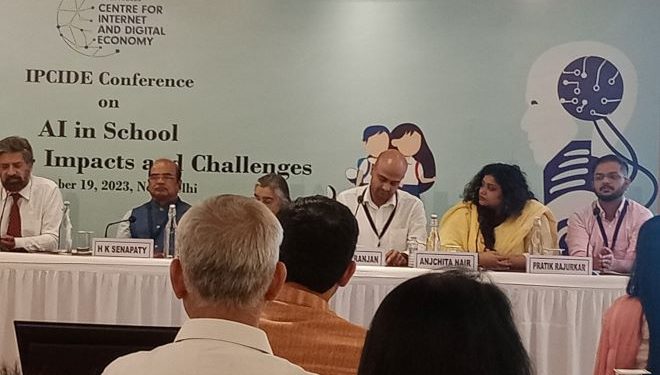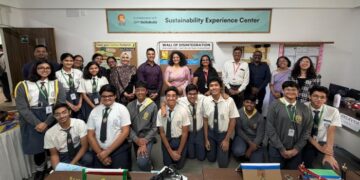The Centre for Internet and Digital Economy of the Indian Council for Research on International Economic Relations (ICRIER), Delhi-based think organized a day-long conference on ‘AI in School Education – Impacts and Challenges’ in which a cross-section of expert and practitioner voices discussed the emerging scenario of the AI’s ‘intrusion’ chiefly through the ChatGPT App into schools after it was formally launched on March 17 this year in India.
Terming the AI the most consequential technology after the advent of printing press, Rajesh Ranjan, Director, Government Affairs and Public Policy, Microsoft India, said the new technology has the potential of democratizing the aspirational exposure and quality often associated with urban schooling and improve rural schools and under-resourced schools. “It can give superpower to teacher through a lot of information and knowledge, who can put it back into the classroom learning process. It will repower the shift of teacher to a facilitator,” he added.
Professor Rangan Banerjee, Director, Indian Institute of Technology Delhi, who delivered the keynote at the inaugural session termed school education critical for the development of human intellect and therefore, urged for laying emphasis on developing the understanding among children on the limitations of AI. “There are still a lot of challenges for humanity to conquer as everything is not still understood, so students should be taught importance of developing and growing human intelligence. The system and establishment has to take care and frame guidelines even for teachers,” he said.
ChatGPT, which has already crossed 100 million users, is just one AI app and there are host of others in making. How to use AI judiciously is the biggest need given the way students have quickly adopted it. “How we train them in judicious use is an area to look it as the way to teach our students is going to change,” added Dr Vijay Datta, Principal, Modern School, while also advocating delaying it for junior students.
Citing a recent report on how much AI will contribute to shifting from wastage of human resource and time is phenomenal, Pratik Rajurkar, Co-Founder, Polymath AI; Teach For India alum, said it was never possible before.
According to Lt Gen Surendra Kulkarni, Director, Mayo College, AI is a reality and schools need to accept it, switch roles and adopt it. “How do you adopt it is the name of the game? Instead of debate concentrate on merit,” he said. Kulkarni also made the practical suggestion for advocates of keeping AI away from schools. “Like tobacco or drug addiction prevention uses consequence for awareness, the best policy would be making children aware how best to use it and how we can prepare them to skill for it.”
One of the biggest fears and criticism of AI has been how students are using it to cheat and write their exams/assignments. For this Purna Bose, Senior Solutions Engineer, Turnitin, suggested teaching teachers and student the importance of citations, how unethical plagiarism is and also about patents from a young age so that the motivation for misconduct is addressed.
Cutting biases and misinformation will be challenging though the platforms have inbuilt check and balances, however, A N Ramachandra, Former Joint Commissioner (academics), Navodaya Vidyalaya Samiti, demanded transparent algorithms from AI app providers.
While AI presents one of the greatest opportunities to leapfrog for school education in India, Monal Jayaram, Director, Piramal Foundation, felt sensibilities must be developed among children in schools as AI bombards our life from everywhere requiring us to make informed choices and decisions. “Barrowing from the Prime Minister’ coinage of Atmanirbhar, I would say we need to reimagine education to bring it as a deep value in development of our children besides compassion and empathy,” she said.
In view of Summiya Yasmeen, Co-Founder and Managing Editor, Education World, AI will greatly help children with special needs, and it definitely will play a big role in their education. “However, teacher training is an area, which needs a lot of attention besides bridging the digital divide,” she said.
Professor H K Senapaty, Former Director, NCERT, expressed optimism that with NEP 2020 the focus will move from content mastery to competency mastery and schools will be able to face the challenges posed by these emerging technologies.










